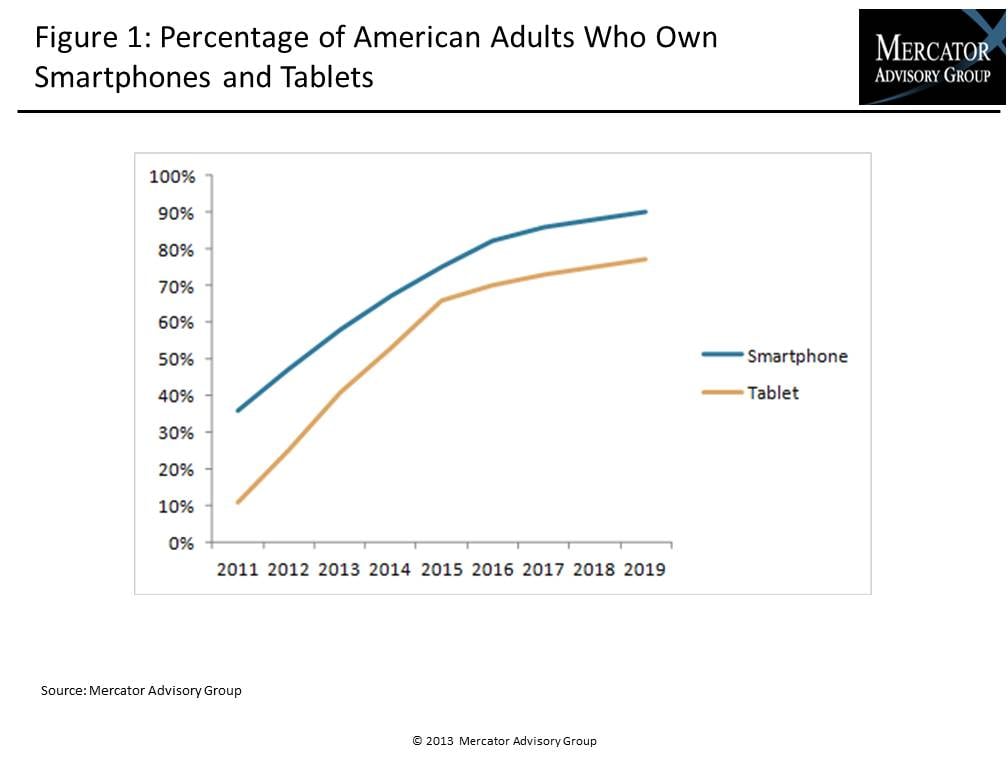Overview
Today, mobile devices are capable of performing most of the same functions as a traditional personal computer. From Internet browsing to word processing, online chat to digital media management, smartphones and tablets are replacing PCs as consumers' default computing devices.
Unsurprisingly, this trend is affecting online shopping and payments in a significant way. Consumers are realizing that their mobile devices are not only fully able to conduct e-commerce but are also, in many ways, more convenient and efficient than PCs at doing so.
Mercator Advisory Group's new report, M-Commerce: Opportunities, Challenges, and Inevitability, details the significance of mobile devices to online commerce, as well as the advantages and challenges of m-commerce that are unique to the mobile platform. The research also compares mobile apps with mobile optimized websites, analyzing how the two approaches to tailoring e-commerce to the mobile platform fit into the mobile strategies of various types of merchants. Finally, the report profiles a number of innovative ways that merchants are utilizing the mobile platform to provide a unique shopping experience for their customers.
"While proximity-based wallets are receiving the lion's share of the publicity, mobile e-commerce (or m-commerce) is witnessing the vast majority of transaction volume," says Dave Kaminsky, senior analyst in Mercator Advisory Group's Emerging Technologies Advisory Service and author of the report. "As m-commerce transaction volume continues to grow, the most important concept merchants need to understand is that they have no control over whether or not they participate. Anytime a consumer accesses an e-commerce site using a mobile device, that merchant is participating in m-commerce. What merchants have control over is the m-commerce experience they provide for their consumers."
One of the exhibits included in this report:

Highlights of the report include:
- Detailed explanation of why mobile devices are being used for e-commerce and why that usage will continue to grow rapidly
- Analysis of the e-commerce challenges unique to the mobile platform and suggested solutions for overcoming those challenges; includes a list of vendors providing such solutions
- Comparison of the relative benefits of mobile apps and mobile optimized websites with a determination of which solution fits best with specific merchants??? mobile strategies
- Profiles of innovative uses of the mobile platform by online merchants that provide their customers with shopping experiences unique to m-commerce
Book a Meeting with the Author
Related content
Agentic Standards: Platform Opportunities and Platform Solutions
The development of open agentic commerce protocols—notably the Universal Commerce Protocol (UCP) and Agent Commerce Protocol (ACP)—represent an expected and necessary alternative t...
Are Consumers Showing Interest in Direct Payments?
Javelin Strategy & Research’s data dives into consumer behavior show that consumers’ usage of and interest in lower-cost payment methods like account-to-account transactions and pa...
2025 Emerging Biometric Authentication at the Point of Sale Scorecard
This inaugural Javelin Strategy & Research scorecard assesses the emerging market for biometric authentication at the point of sale and identifies three Pillars in this emerging te...
Make informed decisions in a digital financial world